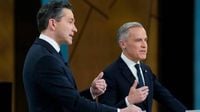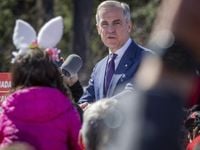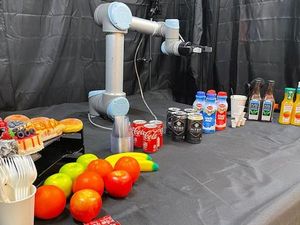With the federal election campaign entering its final week, Liberal Leader Mark Carney rallied supporters in Nepean, Ottawa, on Sunday, April 20, 2025, urging them to vote and reinforcing his party's commitment to addressing pressing economic issues. Thousands gathered at the Lusitania Portuguese Club, many adorned in Liberal merchandise and brandishing signs in support of Carney and local candidates.
During the rally, Carney reiterated his promise to eliminate interprovincial trade barriers by Canada Day should he win the election. He emphasized the importance of diversifying trade away from the United States, seeking "reliable trading partners" instead. This pledge comes in the wake of escalating trade tensions, particularly following U.S. President Donald Trump's recent tariffs on Canadian goods.
In March 2025, Trump imposed a 10 percent tariff on Canadian energy and a staggering 25 percent tariff on various Canadian imports. In retaliation, Canada announced its own 25 percent tariffs on $30 billion worth of U.S. goods, including spirits and clothing. Carney characterized these actions as a betrayal, stating, "This is the most consequential vote of our lifetimes because President Trump has ignited a trade war that has ruptured the global economy and changed forever our relationship with the United States." His remarks were met with boos from the crowd at the mention of Trump’s tariffs.
Carney did not shy away from criticizing Trump's threats to annex Canada, asserting, "We need that strong mandate. Let’s face it, President Trump is trying to break us so that America can own us. That will never happen. … We’ll stop that from happening." He urged Canadians to remember the lessons of betrayal and emphasized the need for unity and mutual support among citizens.
In a pointed jab at Conservative Leader Pierre Poilievre, Carney claimed that Poilievre was ill-prepared to confront Trump, stating, "In a crisis, a plan provides direction when there’s a fog of uncertainty. … You need the government to step up and lead when the private sector is retreating under anxiety and uncertainty, and that’s what our plan to make Canada strong will do." He further asserted that he has accomplished more in nine days of campaigning than Poilievre has in his decades in politics, adding that Poilievre has "got his pension."
As the election date approaches, the stakes are high not only for Carney and the Liberals but also for other political factions vying for influence. NDP Leader Jagmeet Singh and Conservative Leader Pierre Poilievre were both active in British Columbia on the same day, making announcements and engaging with their supporters. The NDP and Liberals had recently unveiled their costed platforms, while the Conservative party's platform remains under wraps.
Amidst the political fervor, some advocates are concerned that critical issues such as housing affordability are being overshadowed by the looming threat of tariffs and trade disputes. Suzana Dumo, a housing advocate from Edmonton, noted that the ongoing tensions with the U.S. have pushed housing issues to the background. "Unfortunately, with this tenuous relationship between us and our friends in the south, this issue of housing, unfortunately, is kind of getting lost in the noise about tariffs and whatnot," she remarked.
As advance voting continues, many young voters in Montreal remain undecided, with a recent survey indicating that half of Quebec voters aged 34 and under have yet to choose a party. These voters express a willingness to engage but are strategically weighing their options rather than aligning strictly with their values.
In a unique twist to this election, the riding of Carleton features a ballot measuring 97.08 centimeters long, due to the inclusion of 91 candidates. This unprecedented length has led to adjustments in voting procedures, including how votes will be counted, highlighting the unusual dynamics of this election cycle.
As the campaign reaches its climax, Carney's rally in Nepean exemplifies the urgency felt by Liberal supporters and the broader electorate. With significant economic issues at stake, including trade relations with the U.S. and internal trade barriers, the outcome of this election could have lasting implications for Canada’s economic landscape.
Carney's assertive stance and promises to invest in Canadian technology and skilled labor reflect a commitment to protecting Canadian workers amidst turbulent international relations. He emphasized that the government must lead in times of uncertainty, a message that resonates with many voters facing the realities of a changing global economy.
As the clock ticks down to the April 28 election, the political landscape remains charged with anticipation, and the decisions made in the coming days will shape the future of Canada for years to come.






